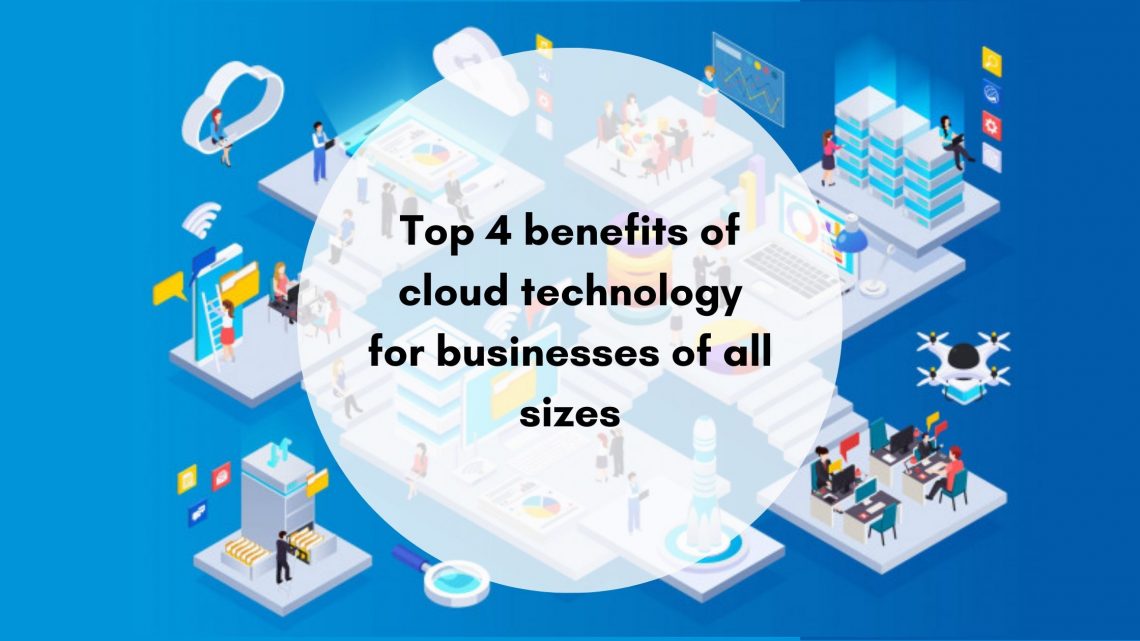
Top 4 benefits of cloud technology for businesses of all sizes
Cloud computing enhanced the delivery of IT services. According to experts, Cloud computing will have a qualitative impact on businesses. The concept of dependence on third-party service providers to fulfill computing requirements has gained considerable traction.
Now, what does cloud computing mean? According to PC Magazine ‘s theory, it is internet-based storage and access to programs and data, rather than on your computer’s hard drive.
It is basically the delivery of numerous IT services – software, resources, disaster recovery, and virtually any IT service – through online connections instead of through the physical infrastructure on-site.
Using the cloud, you can set up a virtual office with the ability to link your company to other organizations across the globe. As web-enabled apps increasingly being used in different business environments, such as smartphones and tablets, the cloud offers greater access to data.
Cloud provides numerous advantages that are essential to leverage but with proper professional guidance and training.
Let’s discuss the top 4 benefits of cloud technology for businesses:
Highly Economical
Cloud Computing’s major benefits are high savings on a company’s IT costs. Businesses of every size can save on tools, infrastructure, and software their huge capital costs. In addition, extra processing power can be leased over the Internet without the necessity to use high-priced machines as servers.
The business move to the cloud helps you to reduce the capital and operate costs on infrastructure, software, and maintenance fees because you’ll be using cloud service provider resources. The arrangement with the cloud service provider will cover the costs of upgradation of systems, hardware and software installation, etc.
In fact, you don’t require hiring IT professionals without upfront spendings on energy usage for managing your data center. As on a utility-based network, you pay to your service provider for what you are using. Cloud platforms require a minimum upfront investment relative to on-premise systems.
Control over document
As several employees from multiple locations can work on a single document; the need for the shareable document has increased. Earlier employees generally use to share files back and forth through email attachments so that one person would be able to work on at a particular time. It ends up forming a mess of text, title, and format of different files. Data are likely to multiply with the growth of businesses and the potential for complexity is likely to increase.
In the cloud, data is stored centrally and everyone views the same copy, improving the overall workflow. The clear visibility results in enhanced collaboration with a healthier end result and business process efficiency. When you still rely on conventional methods, then it can take time to do things more efficiently and smoothly.
Business Continuation
You get a reliable backup, recovery, and business-continuity plan when you move to the cloud. In the case of an emergency, whether technical or natural, companies can work constantly without any data security and data recovery problems as cloud restores all data within a short period of time so that workflows can run seamlessly without any disturbances.
Traditional business continuity and disaster recovery approaches do not guarantee success. In order to manage full data, the businesses that still adopt these approaches need a full set of infrastructure that reflects the essential systems of an organization together with high storage. In a colocation facility, this emphasizes the presence of a mirror data center environment.
Cloud prevents you from a capital outlay of hardware & high maintenance costs of duplicating your output data on the mirror device, physically moving all the data from one server to another. Cloud also reduces downtime risks and lets you get out of it. When you transfer to the cloud, your business benefits from a massive pool of advance IT resources without an upfront investment requirement.
High Security
Security is something that is mostly discussed in the cloud, and that’s why reliable cloud service providers take security as their top priority. They are taking every required precaution to secure your data. All devices are built to protect your data from malware attacks, from the physical protection of the data centers to the highest performance firewalls.
You get a higher security-oriented service compared to on-site security. When a natural calamity hits business face power failure, the cloud assures you get access to documents even in downtime and drive operations efficiently and consistently.
Reliable service providers are driven by security just like Vmware, growing cloud infrastructure, and digital workspace technology that advances data centers by uniting private clouds into businesses. For any query about Tally on cloud services visit Tally-on-cloud.com.
Read other related blogs:
–Top 3 benefits of cloud technology for businesses of all sizes
–Top 10 Reasons Why Cloud Adoption Is Necessary For Small Businesses



